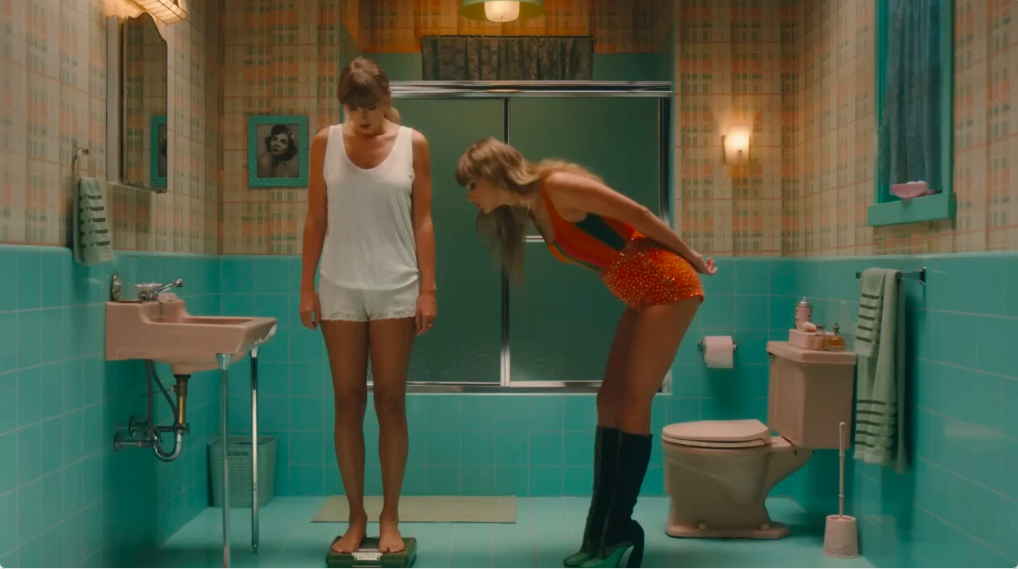It’s been a while since we heard new music from the songstress, Taylor Swift. That was until she broke the internet a few weeks ago with her new album titled, ‘Midnights.’
Swift fans have been obsessing over the new tracks, with many proving to be fan favourites. However, as much as people loved the songs there was one piece of controversy linked to a word in her music video ‘Anti-Hero’, which was deemed ‘fatphobic’.
Enough people spoke out the comment that Taylor went back and made tweaks to the hit’s music video.
After all the ‘fatphobic’ comments were made, it’s the physical act of the edit that is now in question. We are asking, did she need to make the edit or not?
Let’s set the scene
As per CNN, Swift’s ‘Anti-Hero’ music video shows herself standing on a scale that reads “fat” instead of a number. In the video, Swift shows herself standing next to herself (as her inner critic) looking on in complete disappointment. This truly holds a powerful message as it’s become a prominent topic today.
The singer has since removed the scene from her video on Apple Music, and by Thursday morning, the YouTube video had also been updated.
We live in a time where body dysmorphia is an issue that people of all ages face daily. It possesses completely crippling mental and emotional effects that are extremely difficult to understand and talk about. In an Instagram video, Swifts shares that ‘Anti-Hero’ has been her favourite song she has ever written thus far and that she hasn’t delved into her insecurities this deeply before.
Depicting her insecurities in this manner was her way of addressing her own insecurities. She says: “The video was meant to portray my “nightmare scenarios and intrusive thoughts.”
Facing an insecurity is challenging already but because of the backlash, Swift chose to remove it based on what others were saying.
‘Fatphobia’ is a real and traumatic concept to comprehend. Firstly, her putting ‘fat’ on the scale in the first place was courageous. She was able to address a point that many women face because ‘the number on the scale’ is what we’re told counts.
Some people found this offensive and resorted to ‘canceling her’ but others have been very understanding:
taylor swift basically literally made a documentary about her eating disorder and y’all want to cancel her for seeing ‘fat’ when she steps on a scale?!?
— pumpkin lucas theBat (@heavencanthelp) October 21, 2022
Taylor Swift having 5 seconds of a music video that portrays her struggle with eating disorders by having a scale call her fat is 1) not fatphobic, and 2) the absolute least important thing for fat people to be worrying about. Signed, a fat person.
— Spooky Scary SKellyton 💀 (@KLo1012) October 22, 2022
Although the world is warming up to not caring about what’s on the scale so much and focus has shifted to how we feel in our body and clothes, the criticism still hits in a different way for someone who has body dysmorphia or an eating disorder.
Society and social media sometimes paint a picture of the perfect body and instill a fear of being or becoming fat which leads to life-threatening disorders.
So many people are fighting the crushing effects of an eating disorder today and what we need to remember is that an eating disorder is not always related to being ‘fat’ or ‘thin’, it’s about how the person sees themselves when they look in a mirror, which is what many people think Taylor was trying to share.
That self-image is often linked with negative connotations, driving the person to perform drastic and dangerous acts to obtain the desired body ‘standard’. ‘Fatphobia’, in many cases is the leading cause of an eating disorder and yes this is a real and rare image of what people see on the scale but I don’t think this makes Taylor Swift herself, fatphobic.
So much awareness can be raised from this situation. Yes, she edited the video because of comments but does this imply that people who have body dysmorphia and an eating disorder can change as easily as an edit and everything will be rosy again?
Unfortunately, that’s not the way it works. It is a constant inner battle individuals are fighting and to those who are fighting this battle, hopefully, this edit doesn’t cause more harm.
Recently, becoming a size zero has suddenly become popular again, a so-called problematic trend; still it is digging a deeper hole for any person already fighting an eating disorder.
Swift has been open and honest about her body image issues when she addressed her eating disorder in her 2020 documentary – ‘Miss America’. To me this was an act of bravery where she felt safe to address this issue in what she loves – song.
Swift is not the first musician to make edits on their work. Beyoncé and Lizzo both recently edited lyrics that came under criticism for different reasons.
Despite the controversy that has risen, it has seemingly had very little effect on the album’s popularity. Swift’s new album has sold more than 1.2 million album units in the US during its first three days of release, according to Billboard.
Maybe the critics missed the entire point and true meaning of what Taylor was trying to portray.
ALSO SEE:
Featured Image: Screenshot from ‘Anti-Hero’ music video/Republic Records

